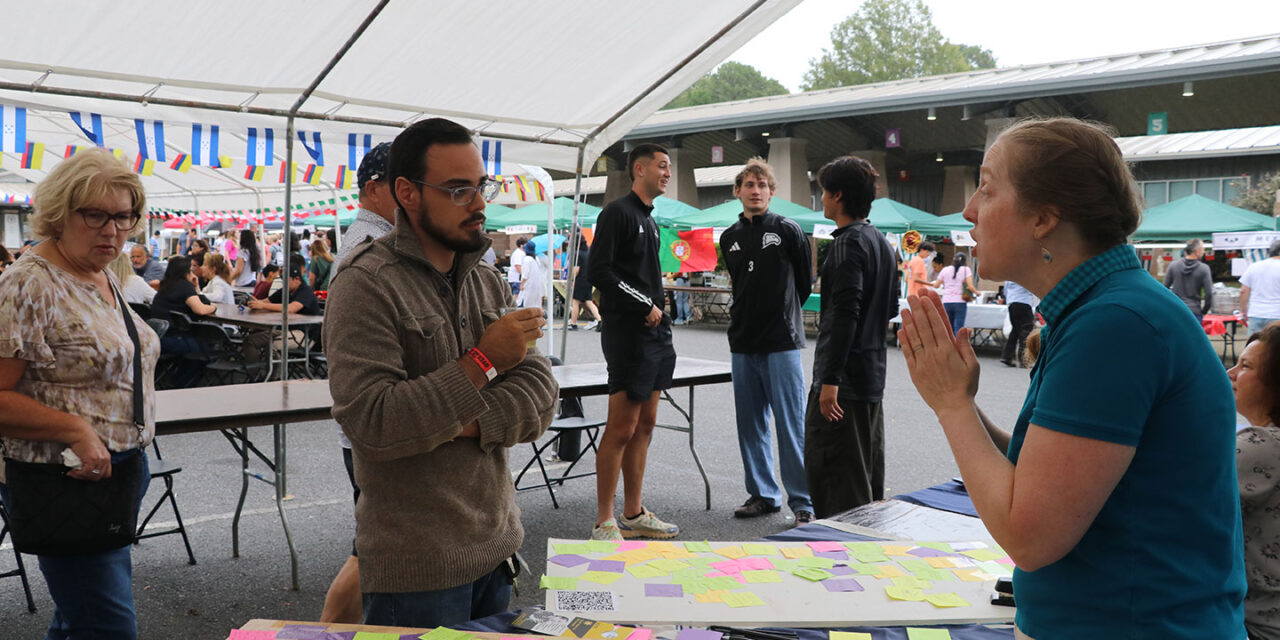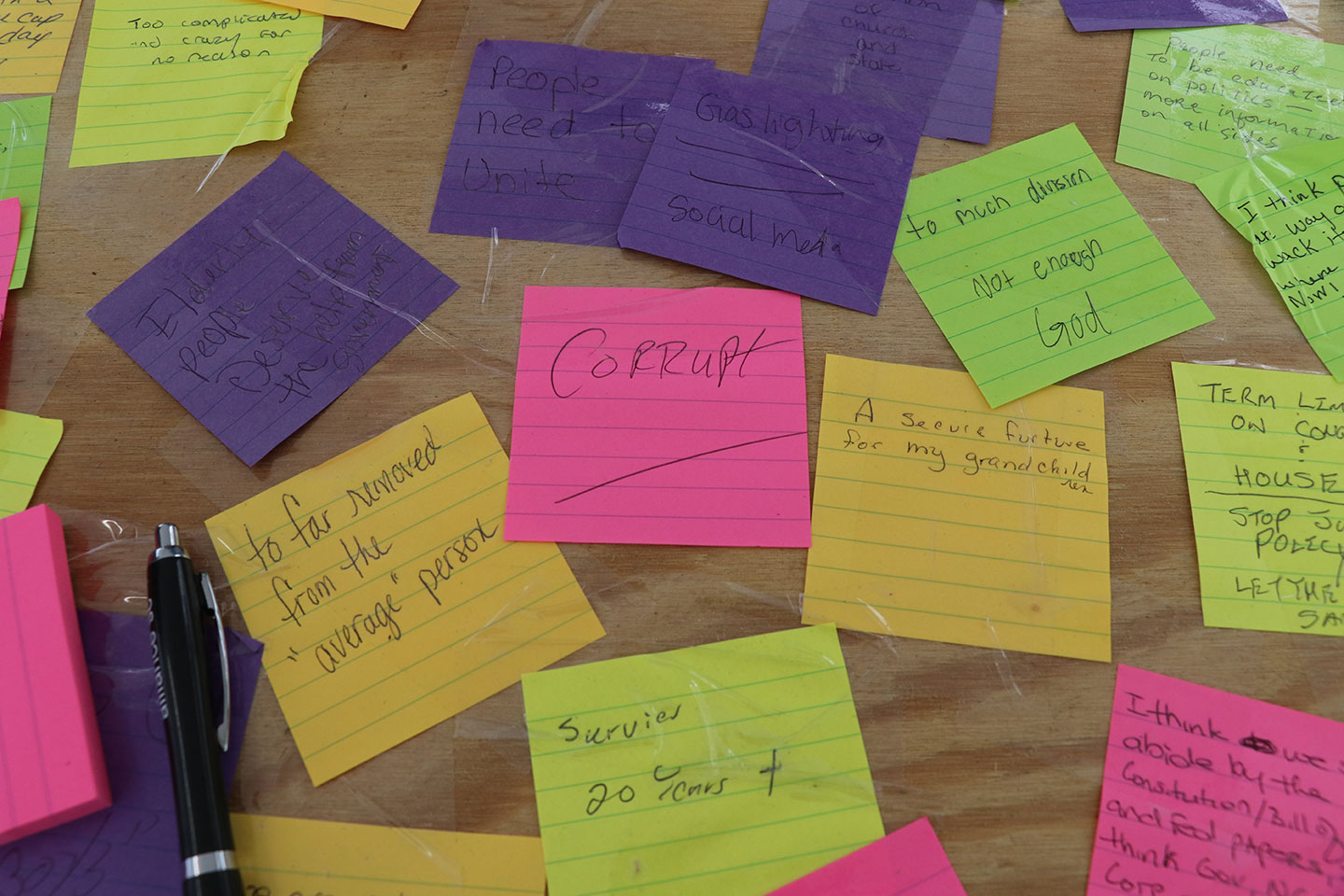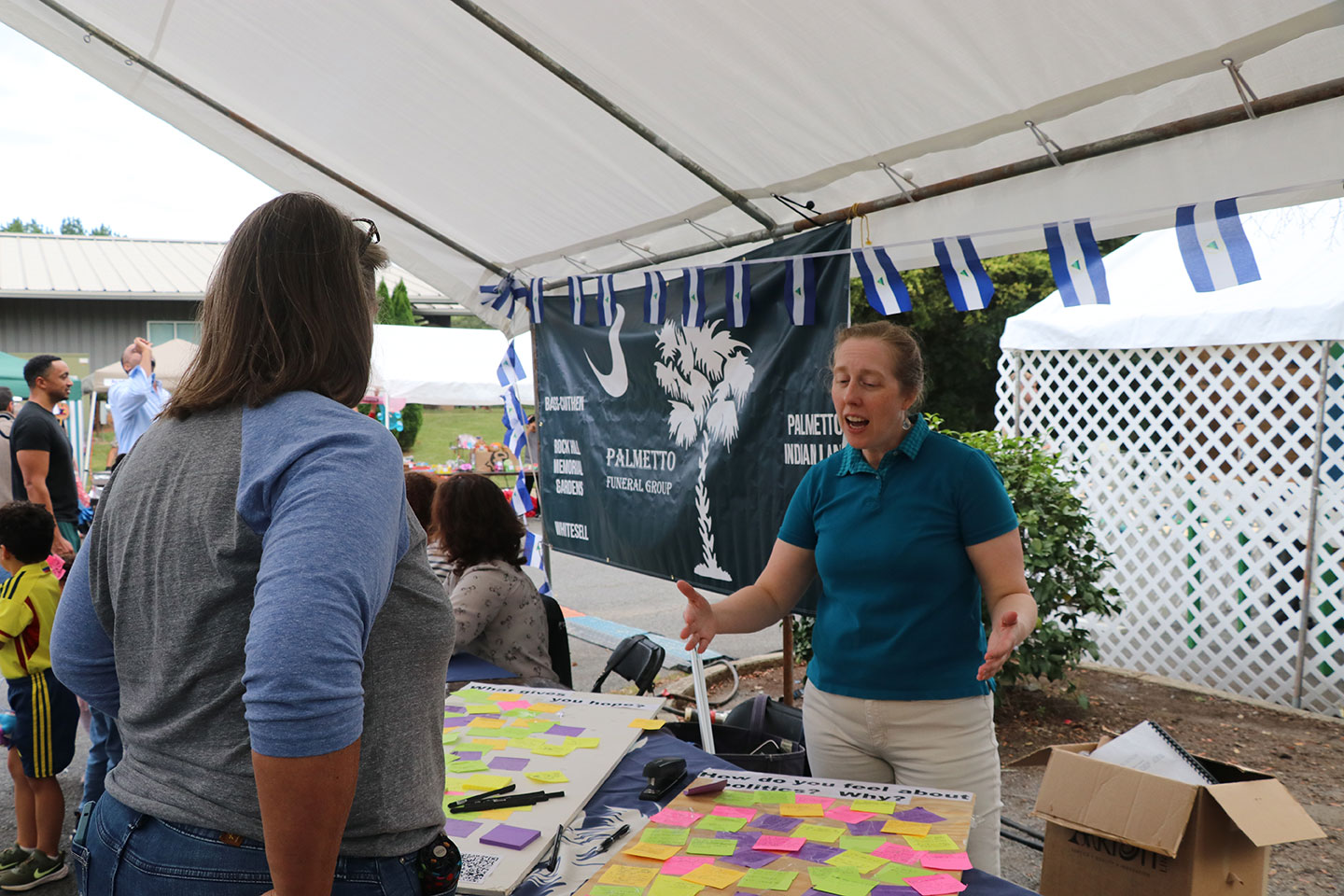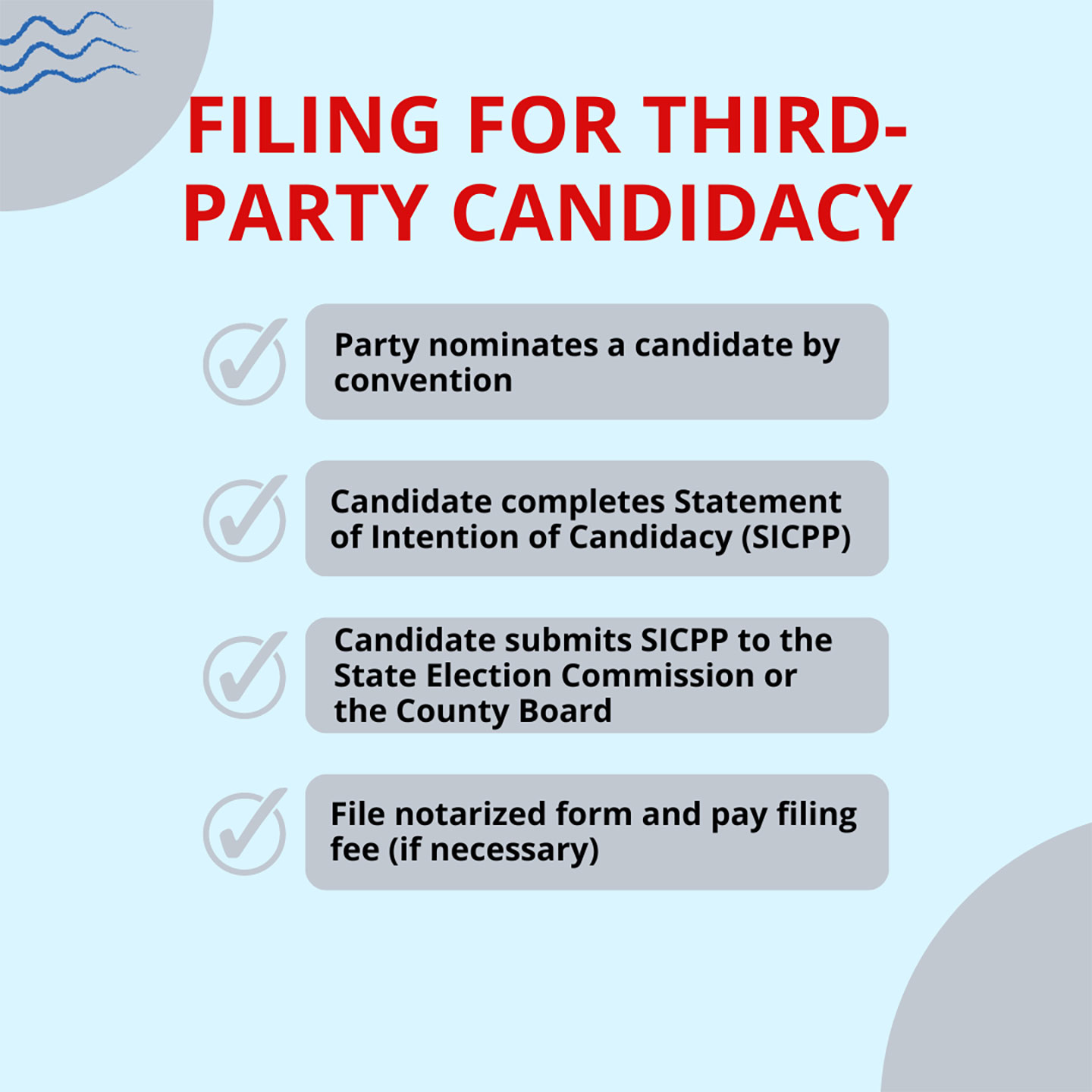Alliance Party candidate Sarah Work discusses politics with York County resident Joseph DeMarzo. (Photo by Geri Johnson/Carolina News & Reporter)
Harold Geddings III, a third-party candidate for the South Carolina Senate and an Uber Eats driver, doesn’t have much of a campaign budget.
So, as local election primaries ended, Geddings got creative.
“I went through the towns and the cities and the thoroughfares and byways and grabbed every campaign sign I could find from a losing candidate,” Geddings said. “So I’ve got a garage full of those. And what I’m doing is I’m going through and repainting them all.”
Despite fewer funds and less exposure, there are 22 third-party candidates in the state running for the state legislature or the U.S. Congress this fall — the most since 2018.
“Anything you can do to prove that you are who you say you are, that you’re not just one of those fake populists, that you’re really one of them, you know,” said Geddings, 46, of Calhoun County. “People respond to that.”
Geddings is running for the South Carolina Workers Party, which strives to represent the working class, and pushing for infrastructure investment, higher wages and equal access to education. Other parties with candidates in South Carolina include the Alliance Party, the United Citizens Party and the Constitution Party.
During a contentious election year, these candidates are working to make headway in a bipartisan system. But it’s not an easy task.
Since 2014, third-party candidates have usually represented between 5% and 10% of total legislative candidates in the state. This year, they make up almost 8%. And, in addition to the 22 state and federal legislative candidates, five third-party nominees are on the presidential ballot.
“It’s a slog because I’m running against someone who doesn’t have to campaign,” said Sarah Work, a South Carolina Senate candidate in Rock Hill said of her Republican opponent, the race’s incumbent. “I don’t even think he feels as though he has any competition because I’m not running as a Democrat.”
Work is a candidate for the Alliance Party, which advocates for financial transparency in the government. In compliance with the party’s policy for candidates, Work’s website has a page displaying her tax filings from the past seven years.
The 43-year-old mother of four is running against incumbent Republican Wes Climer in York County. Climer has held the office since 2016.
“I’m connecting with people, but you have to be able to connect … every day, all the time. And it’s hard to do when you’re running a business, trying to maintain a family and run for office,” Work said.
A unique election year for SC’s third parties
Chris Nelums, a South Carolina senate candidate and chairman of the United Citizens Party, said he’s excited for this year’s elections. The UCP, founded in 1969 to promote African American representation in the government, has a presidential candidate on the state’s ballot for the first time.
“We’re making some major steps,” Nelums said. “Since 1969, we have never gotten to this plateau and we’re there.”
The UCP’s presidential candidate, Cornel West, is running on racial and economic justice, workers’ rights, and healthcare equality. West is affiliated with multiple third parties across the country. With the support of these parties, West is officially on the ballot in 16 states and a write-in candidate in two additional states.
The UCP also has two candidates running in the state’s legislative elections this year. Filing for candidacy with a third party in South Carolina starts with a nomination process, either a primary election or a party convention. Candidates nominated by primary election must also pay a filing fee, which is calculated by the State Election Commission. The candidate then files a Statement of Intention of Candidacy with either the Election Commission or the candidate’s local county board.
As chairman of the UCP, Nelums is not only running his own campaign but also promoting West’s presidential bid. Nelums’ platform is based on judicial reform, economic balance, and resolving health disparities.
“Being a third party, it gives the opportunity for those who are disenfranchised. They have an opportunity to really have their voice heard,” Nelums said. “That is the most important thing.”
Nelums ran for state House of Representatives with the UCP in 2008. But since then, Nelums has noticed a shift in the political landscape.
“Things are changing because people are excited about the election, but they’re not excited about the candidates,” Nelums said. “They’re looking for someone fresh and new. They’re looking for somebody who’s going to share information that will truly push us forward as a people.”
Geddings has also felt a change in sentiments toward third-party candidates. In 2014, he ran for U.S. Congress in District 2, covering parts of Lexington and Richland counties, against opponents Joe Wilson and Phil Black. Back then, Geddings says, local radio shows invited Wilson and Black as guests but not him.
“I’m having to call in as, like, a regular caller,” Geddings said. “Oh, yeah, by the way, there is a third candidate in this race. You know, you may have forgotten about me, but I am on the ballot.”
Ten years later, Geddings says his current campaign has received many requests for similar interviews.
“I don’t know what to attribute that to. Maybe people are just getting sick of the red versus blue freaking mentality and are willing to entertain the notion of something else,” he said. “Whatever, you know? I’m just happy to be here. I’m happy that people are actually caring what I have to say.”
Voters want more options
While independent candidates may have gained a seat at the table, many voters are reluctant to cast their vote for anyone who is not a Republican or Democrat.
Only one member of the South Carolina legislature does not belong to either party. Mia McLeod, a state senator representing northern Richland County, left the Democratic Party to become an independent six years after she was first elected.
Work says this is because voters do not believe third parties have a chance to win.
“I think more people want third parties, but they want third parties that are viable, and they’re only viable if everyone starts to think they are,” she said.
The husband of Rock Hill’s Sarah Work is among the voters who are happy to vote for a local third-party candidate but disinclined to cast a third-party vote for a national election.
“I’m probably never going to vote for a third party for president because I feel like it’s helping one of the other two,” Ryan Work said. “I think, unfortunately, we’re really stuck with the way our system is right now.”
Some third-party supporters believe, even if the candidates are unlikely to win elections, they have a chance to do something just as important.
Joseph Oddo is an Alliance Party candidate for the U.S. House of Representatives in District 6, the seat now held by Democrat James Clyburn. He supports alternative energy, term limits for elected officials and ending gerrymandering. Oddo says he’s not running with the expectation of winning. He just wants to shift the conversation.
“I don’t use the term that I ‘lost’ the election because I win by running,” Oddo said. “I may not get elected, but … I do have the opportunity to alter the agenda, to bring other voices to the table, to change the dialogue.”
Geddings has similar hopes for his own Workers Party.
“By us existing as a party, us out here doing what we’re doing, we can, in our own way, push the debate,” Geddings said. “Whether we win or lose, it’s kind of immaterial. … We’re talking about the issues that the other parties don’t want anything to do with. We’re forcing them to speak up on it, too.”
York County voter Joseph DeMarzo says third parties have the power to restore his faith in democracy. Even without the assurance that the candidates will win their elections, he says third parties have a place in government.
“I think third parties are … the balance keepers,” DeMarzo said. “If we go independent, it gives us an opportunity. It doesn’t guarantee anything. But it gives us an opportunity to kind of reset the system.”
Work runs a survey at political events and festivals, asking constituents what they think about politics. (Photo by Geri Johnson/Carolina News & Reporter)
Work worked a table at an International Festival in Rock Hill in September to connect with voters. (Photo by Geri Johnson/Carolina News & Reporter)
The process that third-party candidates go through to make it onto the S.C. ballot (Graphic by Geri Johnson/Carolina News & Reporter)
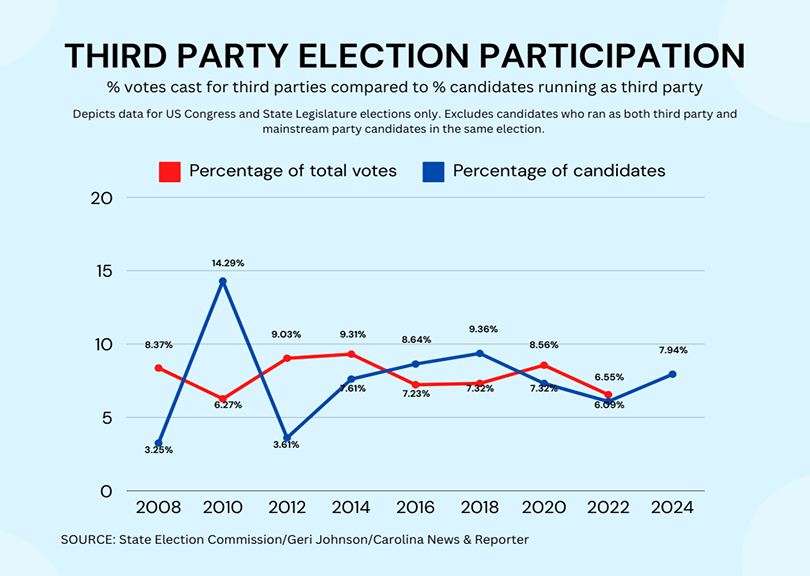
Data represents state and federal legislative races in South Carolina since 2008. Note: The spike in 2010 is due to the U.S. House District 1 race, which had five third-party candidates running.
Data collected from the SC Election Commission

